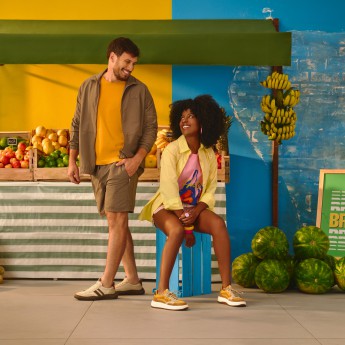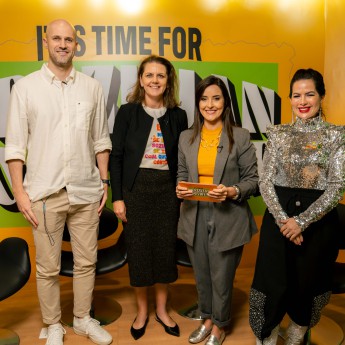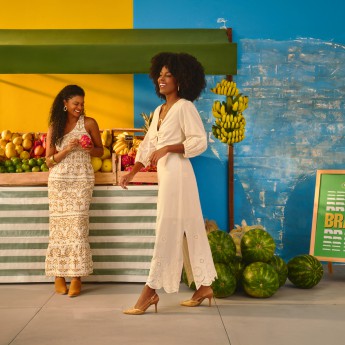Shoemakers who built an international powerhouse
Know more shoemakers who helped - and help - create this victorious history of the Brazilian footwear industry
2021-11-11 | By Brazilian Footwear
 Shoemakers who built an international powerhouse
Shoemakers who built an international powerhouse
With a century-old history, the Brazilian footwear industry is now the fifth largest on the planet and the largest in the West. Despite all the problems, especially the so-called Brazil Cost, which makes the sector less competitive against the main international competitors, companies do, with care, their “homework”. Factories across the country use creativity, resilience and excellence to put on shoes for consumers in more than 160 countries.
This success story, however, was not built by chance, it was through much sacrifice and struggle. In this edition of Abinforma, alluding to Shoemaker's Day, celebrated on the 25th, shoemaker entrepreneurs who helped - and help-create this victorious story tell a little of their stories. It is a simple tribute to all the actors who built the national footwear industry.
Jorge Bischoff, director of Bischoff Group
Recognized as one of the great designers of Brazilian fashion, Jorge Bischoff began his career in the world of footwear from an early age. "My mother and father worked at the old Ruth, in Igrejinha / RS. I would go with my parents to the factory, see how the processes worked. I was often there pushing some wrong buttons in their machinery”. When he grew up, Bischoff started making a living in other professions, beginning his professional training in worlds quite distant from fashion. "I was a waiter and started studying accounting, my mother wanted me to be an accountant,” she recalls.
Bischoff says he always had a habit of drawing during classes. “One day a teacher stopped by my side and said he would rotate me, because otherwise I would be insisting on being an accountant and give up on my dream, which was the world of shoes,” he recalls, pointing out that that fact was decisive for the turn in his trajectory. Dropping out of the Accounting course, Bischoff went on to study shoe modeling at Senai, starting his career developing handbag collections for a small local factory. “During a fair in São Paulo, I ended up being interviewed by a popular news vehicle and Tibúrcio Grings (director of Piccadilly at the time) read the article and called me to work with him". There began a history of connection with footwear that would culminate in the creation of his own and homonymous brand, in 2003, and with a store on the trendy Padres Chagas Street, in Porto Alegre/RS.
Currently, Bischoff Group bets on expansion by franchising, with 90 exclusive stores in Brazil and the forecast to exceed 100 stores by early 2022. As it has a strong online presence, the company managed to absorb part of the impact of the pandemic in 2020, when it sold 1.3 million items, including shoes, bags and accessories (in 2019 that number was 1.9 million). By 2021, the company is expected to market 1.6 million pairs/pieces. The pre-pandemic level should be overcome next year, with more than 2.2 million pieces sold, with about 20% of products exported to countries such as Puerto Rico, Colombia, Israel, United Arab Emirates, South Africa, among others.
Bischoff points out that the challenges for the profession have always existed, being updated over time. "When I started my career, you had to travel in order to know trends, today you can do that while sitting in the living room. I travel the world in one or two hours”, he evaluates, pointing out that, however, the inherent difficulties of the world of entrepreneurship are very similar, because it is still very expensive to produce in Brazil, especially in front of the main international competitors.
Juarez Pinto Martins, director of Marina Mello
Created in 1982, in the still unknown footwear hub of Nova Serrana/MG, Marina Mello is a Brazilian reference in women's shoes. Founder and current director of the company, Juarez Pinto Martins says that from a very young age he had the routine of footwear inserted in his life, having been a boot hitter, cutter helper and treadmill supervisor before reaching the sales and administrative sector in footwear companies in the Minas Gerais state hub.
At the age of 22, he decided to go a step further, creating his own company. With only three employees and producing 30 pairs of men's sneakers daily, the company took a qualitative leap when it went on to produce leather women's shoes. "In 1982, we just wanted to make a quality product. Nowadays, it is not enough to have quality, it is also necessary to have quality differentials and also aesthetics", recalls Martins. Passionate about the profession, Martins is passing the passion to his son, Rodrigo Martins. "Rodrigo has been with me for 10 years, at the factory. Succession is a natural process," he says.
With a daily production of 700 pairs, the company did not pass unscathed in the face of the crisis caused by Covid-19, especially for its effects on the domestic market, where it sells 90% of its shoes. "The drop has reached 50%. In 2021, we are hanging in there, but it is still unstable. We expect it to get back to normal during the next year,” he predicts, pointing out that the biggest challenge in the sector right now is the normalization of the supply chain in the face of the disruption caused by the pandemic.
Irivan José Soares, director of Lia Line
Fourth son of a family of shoemakers from Santa Catarina, Irivan José Soares was born in the world of footwear. And due to the interest he showed for the footwear sector, he began working while still very young in a footwear industry of the São João Batista/SC hub, back in 1988. "I spent two, three years working directly with the production" he says. Then, Soares had an experience in retail, where he perfected his commercial side, until, in 1993, he invited one of his brothers to found his own company. Lia Line was born there, with a production of only 10 pairs of women's shoes daily, a number that today has jumped to more than 30 thousand daily pairs produced by 2.8 thousand employees.
Soares assesses that the challenges of the profession are in the constant changes of scenarios, which have been accelerated by new technologies. “There is a new consumer, which is constantly changing. Understanding these changes is precisely the biggest challenge of our activity" he says, adding that, along with that, it is necessary to take special care with the company's cash flow, in the face of high fixed costs. "The pandemic certainly affected us, but it would be much worse if we did not have a pre-organization of our cash flow,” he says. According to him, the drop reached 30% in production, a number that will not be recovered even before the resumption in 2021. "This year, we should close 5% lower than in 2019. It has been a difficult two years, but we hope to record increases again in 2022," Soares assesses, pointing out, however, that the scenario is still nebulous. “For example, we are at a standstill regarding the renewal of payroll dishonoration, as we will price our products as early as November. This will certainly influence next year's results,” he says.
As for the succession process, Soares says he has already worked together with his two children, aged 20 and 22. “They are two and three years with me and entirely used to the sector. They have already decided that they want to pursue a career in footwear," comments the proud businessman, highlighting that young people have been going through all the departments of the company as a kind of internship for higher flights later.
Wagner Aécio Poli, director of Pé com Pé
Born in Birigui/SP, a well-known hub of children's shoes, Wagner Aécio Poli began his career in the footwear sector at a very young age, as a modeling assistant. After eight years going through several companies in the city, with only 19 years he created Pé com Pé, through a partnership with the businessman Claudenir Antônio Dentine, in 1986.
At first, it was a small factory at the back of his mother's house. With the market on the rise, Poli says he had a "good problem" between 1992 and 1994. “We had grown a lot, we needed to change buildings, set up a branch, but the distance between the units made it difficult for everyone to work. It was then that we moved to a single shed of 2 thousand square meters” he recalls, pointing out that at this stage they already had 125 employees. Today, with more than 500 employees, Pé com Pé produces more than 7 thousand pairs of children's shoes daily. The company exports to more than 40 countries.
Caio Ferreira, director of Radamés
The Ferreira family has been in the footwear industry since 1961, in the city of Franca/SP, considered the capital of men's footwear in Brazil. At that time, Washington Ferreira Coelho, along with his son Washington Ferreira Filho, started the production of handmade shoes with the creation of Calçados Washington, using even recycled tire soles. Over time, the market for footwear grew in the region and the products followed the same path, being first exported in 1978. And in 1992 the company registered the trademark that would gain national and international prominence, Radamés.
Nowadays, the administration of the factory is in charge of Caio Borges Ferreira, a member of the third generation of the family. Ferreira began working early in the industry, at the age of 14, when he went on to accompany his father, Washington Ferreira Filho, in the industry. He learned a lot about shoe production and sought training in Business Administration with the aim of learning more about business development. Ferreira says that, when he started in the company, the focus was on the Northeast market, with more popular products. Over the years, the factory began to produce leather men's shoes with greater added value, with an eye to the opportunities brought by exports.
Currently with a production of 800 pairs daily, Radamés has in the foreign market a fundamental part of the business. “We export 40% of our production to more than 25 countries, especially Colombia, Argentina, the United States and some countries in Asia,” he points out. According to him, the option for the export-oriented model helps the company to the extent that it sprays risks of economic bumps. However, not even this care was enough to hold the crisis brought by the new coronavirus. In 2020, recalls the entrepreneur, the company reached 500 daily pairs, less than half the level of 2019 (1,1 thousand daily pairs). But the crisis also brought important lessons. Ferreira recalls that it was necessary to restructure the financial part of the company, wiping out costs and making the operation more efficient, which he currently considers the biggest challenge for the footwear industries.



